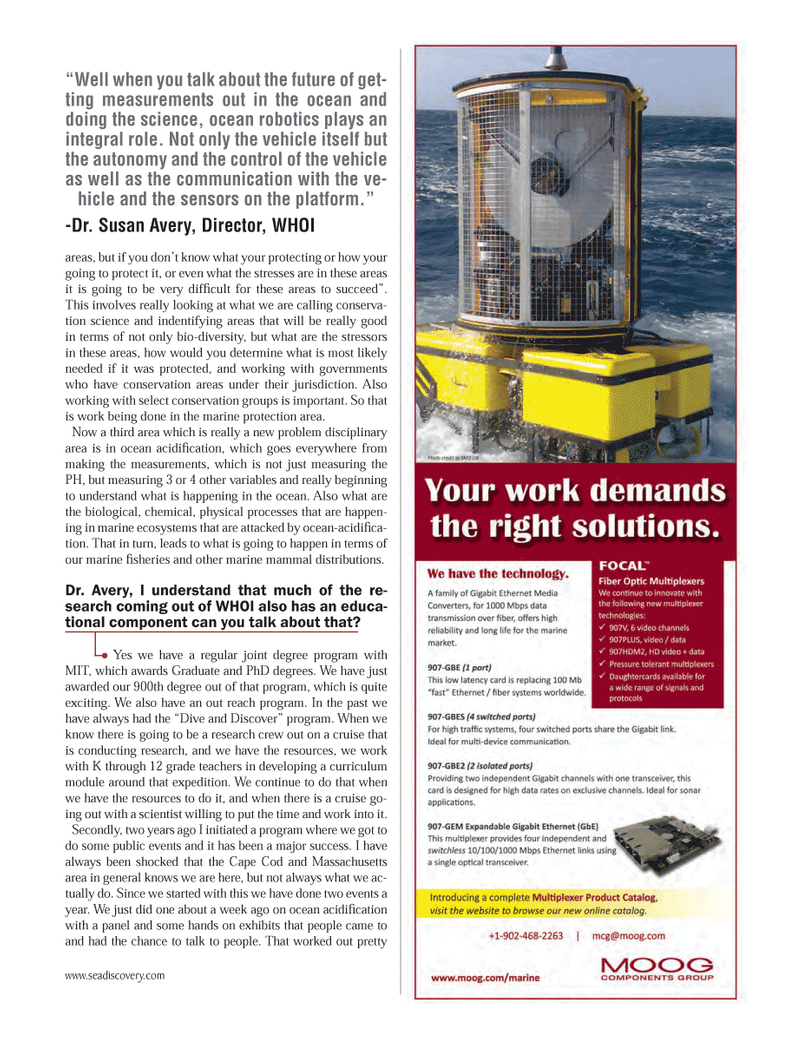
Page 45: of Marine Technology Magazine (September 2012)
Subsea Defense: Protecting Port & Subsea
Read this page in Pdf, Flash or Html5 edition of September 2012 Marine Technology Magazine
areas, but if you don?t know what your protecting or how your going to protect it, or even what the stresses are in these areas it is going to be very dif cult for these areas to succeed?. This involves really looking at what we are calling conserva- tion science and indentifying areas that will be really good in terms of not only bio-diversity, but what are the stressors in these areas, how would you determine what is most likely needed if it was protected, and working with governments who have conservation areas under their jurisdiction. Also working with select conservation groups is important. So that is work being done in the marine protection area. Now a third area which is really a new problem disciplinary area is in ocean acidi cation, which goes everywhere from making the measurements, which is not just measuring the PH, but measuring 3 or 4 other variables and really beginning to understand what is happening in the ocean. Also what are the biological, chemical, physical processes that are happen-ing in marine ecosystems that are attacked by ocean-acidi ca-tion. That in turn, leads to what is going to happen in terms of our marine sheries and other marine mammal distributions. Dr. Avery, I understand that much of the re- search coming out of WHOI also has an educa- tional component can you talk about that? Yes we have a regular joint degree program with MIT, which awards Graduate and PhD degrees. We have just awarded our 900th degree out of that program, which is quite exciting. We also have an out reach program. In the past we have always had the ?Dive and Discover? program. When we know there is going to be a research crew out on a cruise that is conducting research, and we have the resources, we work with K through 12 grade teachers in developing a curriculum module around that expedition. We continue to do that when we have the resources to do it, and when there is a cruise go- ing out with a scientist willing to put the time and work into it. Secondly, two years ago I initiated a program where we got to do some public events and it has been a major success. I have always been shocked that the Cape Cod and Massachusetts area in general knows we are here, but not always what we ac- tually do. Since we started with this we have done two events a year. We just did one about a week ago on ocean acidi cation with a panel and some hands on exhibits that people came to and had the chance to talk to people. That worked out pretty ?Well when you talk about the future of get- ting measurements out in the ocean and doing the science, ocean robotics plays an integral role. Not only the vehicle itself but the autonomy and the control of the vehicle as well as the communication with the ve-hicle and the sensors on the platform.?-Dr. Susan Avery, Director, WHOI www.seadiscovery.com MTR #7 (34-49).indd 45MTR #7 (34-49).indd 459/10/2012 9:59:20 AM9/10/2012 9:59:20 AM

 44
44

 46
46
